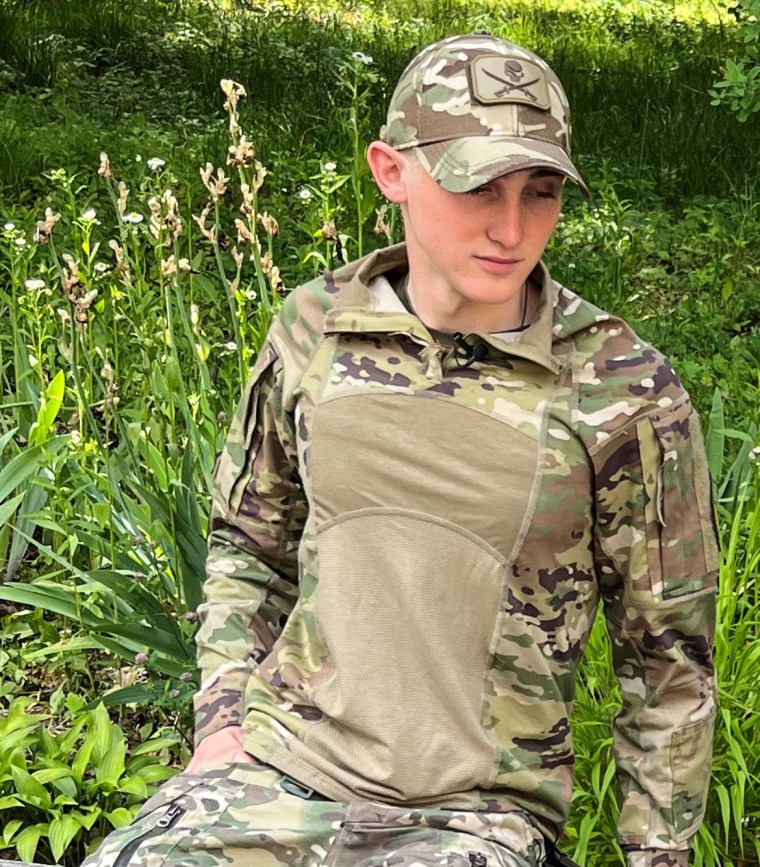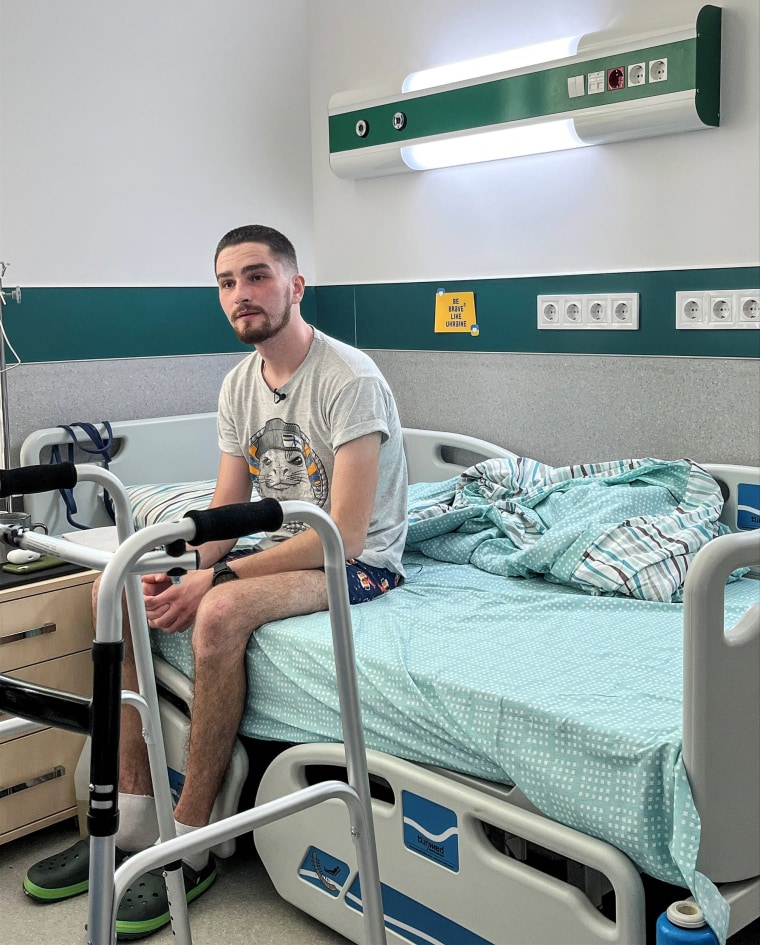ODESA, Ukraine — Torture, beatings and neglect: Ukrainian service members captured during Russia’s invasion may be lucky to be back home alive, but their physical and emotional scars could plague them for years.
One such soldier is Mykhaylo, 20, who said he hadn’t finished his military training when attack helicopters swarmed Hostomel airport near the nation’s capital, Kyiv, where he was preparing to be deployed. It was Feb. 25, the day after Russia invaded.
After an intense battle, he said his fighting group had little choice but to surrender and he was taken captive. He told NBC News that he and his comrades were held in a few locations around the airport before being transferred to a bomb shelter in a fire station. He was held with both military personnel and civilians, 34 people in total, he said. The oldest prisoner was a 70-year-old man, who had been taken captive after he admitted to having military identification, he said.

“Everyone was beaten,” said Mykhaylo who, like many other soldiers, requested that his last name be withheld for security reasons because he planned to rejoin the fight once he has finished recuperating.
After they were captured, he said, “food was tight” and the prisoners of war were provided with just a spoonful of oatmeal and just a few tablespoons of water a day. The Russians “explained this by the fact that they also lacked provisions,” he said at the Forest Valley rehabilitation center on the outskirts of Kyiv.
Mykahlo is not alone. On Wednesday, 144 Ukrainian soldiers were released as part of a prisoner exchange -- the largest since the start of the war. There have been several prisoner exchanges, Ukraine’s military intelligence agency, known by the acronym GUR, said in a statement on Telegram. While neither side will give exact numbers, both sides are believed to have captured thousands during the four-month-old war.
Despite initially losing control of Hostomel airport, a key staging point for a Russian attack on Kyiv, Ukrainian forces were eventually able to retake it and then push the invading troops out of the region around the capital. But that was too late for Mykahlo, who said he had already been captured.
“The peculiarity of tank shelling is that you don’t hear its coming. It’s instant.”
Ukrainian marine Hlib Stryzhko
“The Russians were intent on extracting information,” said Mykhaylo, who said he spent two months in captivity before he was freed in the prisoner exchange.
“They wanted to know about the type of weapons they had, specifically U.S. Stinger and Javelin missiles,” he said. “But we didn’t have that.”
A few days later, Mykhaylo said the prisoners were transferred to a “very cold” meat storage refrigerator before being bused to neighboring Belarus, a close ally of Russia’s, and then flown to Kursk in Russia. There, he said, they spent five nights in freezing temperatures in a tent before they were transferred to a detention facility in the city.
“They took away our uniforms, beat us up, put us in cells and started to take us for interrogations,” he said, adding that every morning they were routinely made to sing the Russian national anthem.
In many ways, however, Mykhaylo said he was lucky compared to some of the other prisoners, both civilians and service members, who suffered far worse punishments.
He said one of his fellow prisoners told him “that they beat him on the kidneys, they beat him on the face, everywhere they could for an hour.”
“When he slept, he was moaning all night long,” he added. “We wanted to help him in some way but we could not do anything.”
Others who had tattoos with Ukrainian symbols “were beaten very badly,” he said.
Ukrainian marine Hlib Stryzhko, 25, was among the fighters defending Mariupol, a city whose treatment at the hands of the Russian forces before it fell prompted disgust and outrage around the world and became a symbol of the Kremlin’s excesses.
Speaking from his bed in the Forest Valley rehabilitation center, he said, he was defending a building April 10, when he turned his head and “saw a tank aiming at me.”
“The peculiarity of tank shelling is that you don’t hear its coming,” he said. “It’s instant.”

Then the “dust blinded my eyes,” he said, adding that he “started falling from the third floor to the ground and the rubble started to fall on me and cover me.”
He said he broke his pelvis and jaw, and lost sight in his left eye. Although he was rescued by his comrades, with no way out of Mariupol, he said the only way to save his life was to get transferred to Russian custody.
Stryzhko said he was taunted, denied medical care and given just enough food to keep him alive at the Russian medical facility.
“My ward neighbors had shrapnel in their bodies. Russians even didn’t pull them out — they were just rebandaging their wounds and their limbs continued to rot,” he said.
International law provides protection for prisoners of war, with the Geneva Conventions decreeing that they must be treated humanely, protected against acts of violence, as well as intimidation and insults. The detaining power is also required to supply prisoners of war who are being evacuated with sufficient food and water, and with the necessary clothing and medical attention.
Russia’s Defense Ministry did not respond to a request for comment about the allegations of mistreatment of captured Ukrainian soldiers.
Olena Vysotska, Ukraine’s deputy justice minister, said that prisoner exchanges have taken place once or twice a month.
“We are very interested in such swaps, because we are very focused on the saving of lives of our military. Sometimes the people swapped are civilians, because the war is going on in our territory,” she said.
Both Mykhaylo and Stryzhko were freed in late April.
After being flown to a military airfield in Crimea, 18 days after he was transferred to Russia, Stryzhko said he was told he was going to be swapped before he was crudely loaded onto a military truck and taken to a hospital in Zaporizhzhia under Ukrainian control.
“The driver of this truck came, knocked my chest and told us, ‘Relax guys now — you are in Ukraine,’” he said. “And at this moment, I started crying. I was very happy.”